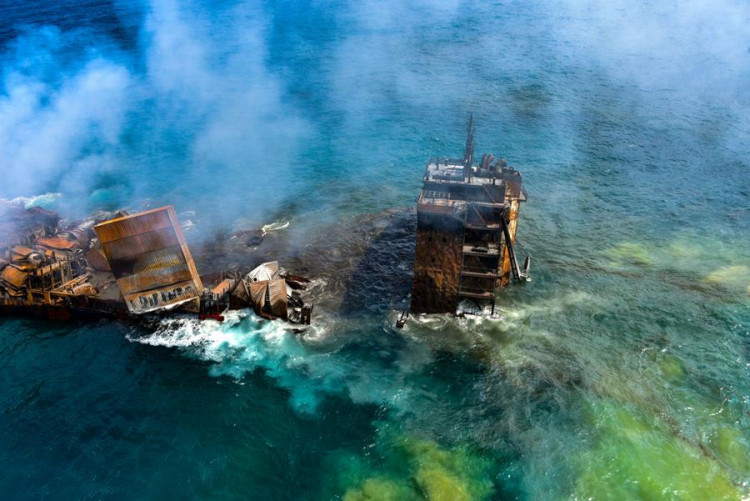The captain and senior officers of the Singapore-flagged fire-stricken MV X-Press Pearl will appear before the Colombo Fort Magistrates Monday as a criminal probe investigation into what maritime experts call the "worst marine environmental disaster" faced by Sri Lanka to date continues.
Meanwhile, Sri Lanka marine experts have located the voyage data recorder, or "black box," of the ship that is sinking off the country's capital, the Khmer Times reported.
Sri Lanka officials hoped the recorder would provide details of the cargo vessel's movements and its communications with the harbor in the capital Colombo - where it had been set to dock.
The accident has sparked fears of a possible environmental catastrophe. The ship is estimated to have held around 300 metric tons of oil when it caught fire.
According to maritime experts, most of the oil may have burnt off during several days of fire. The National Aquatic Resources Research and Development Agency said it could take weeks, if not months, to fully evaluate the effect on the environment.
"Oil, chemicals and plastic pellets are probably the worst combination you can have," Bloomberg quoted Delphine Lobelle as saying. Lobelle is a postdoctoral researcher specializing in ocean plastics at Utrecht University in the Netherlands.
Debris from the ill-fated ship has already affected around 150 kilometers of shoreline, and the Singapore-based ship operator, X-Press Feeders Ltd., faces criminal charges for pollution, the Straits Times said.
Several sea turtle and dolphin carcasses were washed ashore along Sri Lanka's western coastline after the wrecking of the MV X-Press Pearl last week, according to reports.
Sri Lanka's Criminal Investigation Department said it would seek a court order to submit the black box to the agency in order to get a technical report on its data.
The department has recorded more than 20 statements from the 25-member crew, police representative Ajith Rohana said. The three senior members of MV X-Press Pearl were issued summons to appear before court early Monday morning.
The ship was carrying dangerous chemicals, including 25 tons of nitric acid and 350 tons of fuel oil. The ship's operator says oil has not spilled so far. But what is already having an effect on beaches nearby are the 78 metric tons of plastic called nurdles - the raw material used to make most types of plastic products.
Wave after wave of plastic pellets are washing ashore. The ship is about 5 miles from the nearest beach.
"It's a beach that I've been to many times before," says marine biologist Asha de Vos. "It's that idyllic tropical beach with the palm trees and the beautiful sand."
De Vos visited the beach in the past few days. "It was just a beach covered in these white pellets," she tells All Things Considered. "This was after the Navy personnel had been cleaning for days on end. Every time they filled bags and took them inland amongst all these other thousands of bags, another wave would wash in with more pellets. So it just seemed so unending. To me, it was really sad to see."
<iframe width="1280" height="720" src="https://www.youtube.com/embed/aOHYjOAn6a0" title="YouTube video player" frameborder="0" allow="accelerometer; autoplay; clipboard-write; encrypted-media; gyroscope; picture-in-picture" allowfullscreen></iframe>






